Setting the Scene
This is the 3rd Basico Group of Old Boys Escaleta…the U9 age group where the boys are 8 and 9 years old. It is the first part of the Escaleta season, March and April, which is before the school’s season, May to September. The second part is during September and October. The sessions are on a Friday afternoon after school at the school and on a Sunday morning at the Old Boys Club.
It is the first time these boys have ever been coached using ‘Games for Understanding’.
This is the 9th session out of 10 sessions…
Here is the video clip:-
https://www.youtube.com/watch?v=2_FGZIHkyZo
I have never mentioned kicking…
I have never coached kicking to this group of boys…
No player has kicked the ball before in any of the “games”…
The kick at 9s in the clip is the first time a player has kicked the ball in any of the “games”. It is 1min 19s into the last 5 min “set” of the 9th session.
Here is a video clip of an interview I did with Player B 2 days after…at the end of the 10th session:-
https://www.youtube.com/watch?v=_IMrUHy50PM
Transcript of 58s Video Clip
|
Time Reference |
Events/Observations |
|
9s |
Player A kicks the ball to space… |
|
19s |
Player B: “Can we kick it?”Coach: “Did I say you never can?” |
|
22s |
Player B’s reaction/look on his facePlayer B shouts: “We can kick it! We can kick it!” to the rest of the players |
|
42s |
Player B runs/rushes to the tackle/breakdown |
|
44s |
Player C: “Mr Nick…can we kick it?” while doing a simulated kickCoach: “Have I said you never can…we’re playing rugby aren’t we…” |
|
47s |
Player C’s reaction/look on his facePlayer B wrestles for the ball and gains possession of the ball |
|
48s |
Player B looks at the spacePlayer B looks at his teammate |
|
49s |
Player B “calls” his teammatePlayer B kicks the ball to space with touch/precision |
|
54s |
Player D catches the ball after the 1st bounce and scores a try…! |
Key Events/Key Observations
The 1st kick:-
Player B’s reaction/face to “Did I say you never can?”:-
Player B rushing towards the tackle/breakdown:-
Player B wrestling for the ball and Player C asking “Can we kick it?”:-
Player C’s reaction/face to “Have I said you never can?”:-
Player B looking for/at the space:-
Player B looking at his teammate:-
Player B looking to kick to space for his teammate to run on to it:-
Player B’s placement kick, with precision and ‘touch’, to space:-
Player D running on to the ball to score a try:-
Key Questions
- How do you coach what Player B did/does…?
- How do you teach what Player B did/can do…?
- If this is what can be achieved after 10 sessions…what can be achieved after 10 years…?
- Would we have seen/found this LIGHT BULB MOMENT if we didn’t use “Teaching Games for Understanding”/Game Sense?
- Why did Player A and Player B kick the ball…?
Further Thoughts
- Interview Player A to ask: “Why did you kick the ball because it was never done before in any of the previous 8 sessions?”;
- Interview Player B to ask: “What did you see/what were you thinking/why did you do what you did, especially when we have never talked about/taught kicking before?”;
- Interview with Player C to ask: “Why did you look so surprised about my response to your question: “Mr Nick…Can we kick it?”?”
- Create further ways to increase the creativity and curiosity of the boys;
- To think of “conditions/constraints” to facilitate the fact the players can kick like this already at the age of 8 and 9;
- To think of “conditions/constraints” to facilitate the fact the players enjoy the fact they can kick;
- To make sure the players ‘Know and Understand’ when and where to kick.
Thank You
To Brendan Chaplin (@BrendanChaplin) for setting up the first ever Online Strength and Conditioning International Conference where I was able to see and listen to Graeme McDowall’s (@GraemeMcDowall) presentation on Motor Learning and Skill Acquisition from an Ecological-Dynamic Perspective.
This presentation gave me the INSPIRATION to carry out the Research Project I have just done using the “constraints-led approach” with the 3rd Basico Escaleta group.
Research Project
|
Game |
Attack |
Defence |
|
1 |
To score Tries Carry ball in 2 hands |
No conditions |
|
2 |
Same as Game 1 When “tackled” present the ball on the floor If you score out wide you get 3 tries |
“Tackle” = a Grab When there is a “tackle” run and touch a cone on the Touchline |
|
3 |
To score Tries Carry ball in 2 hands |
No conditions |
Results
Conclusions
- Significant increase in ‘Try Scoring Opportunities’ in the 3rd Game compared to the 1st Game in each session except during the 5th session;
- Significant increase in ‘Try Scoring Opportunities’ from the 1st Game of the 1st Session to the 1st Game of the 5th Session;
- Significant increase in the Total number of “Try Scoring Opportunities” during a session over the course of the 5 sessions;
* Try Scoring Opportunity = Try scored or a knock-on in the act of scoring
- One player had never been to a Sunday session before and wanted to keep coming on a Sunday;
Parent Interview Clip: https://www.youtube.com/watch?v=qjc4Vjmjj6A
- One player would just sit on the floor on his own doing his own thing, to being actively engaged during the 10th session;
- One player asked me a week after the last session: “When does the Escaleta season start again Mr Nick?”.



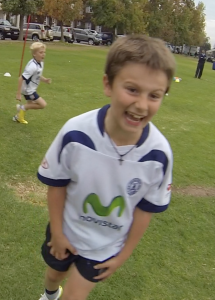
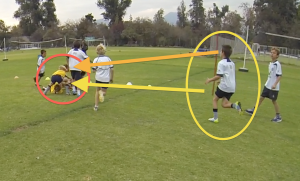
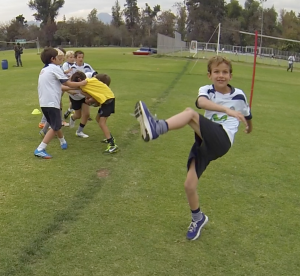
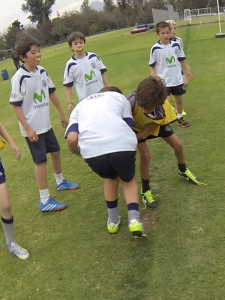
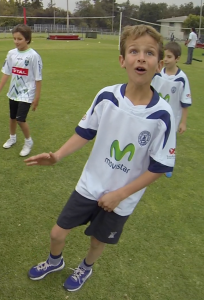
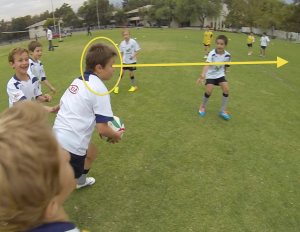
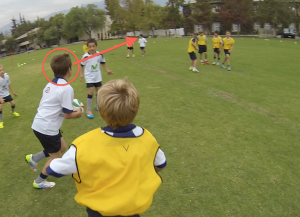
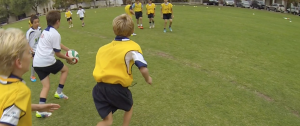
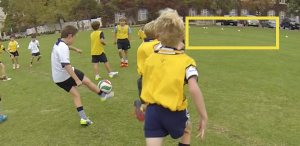
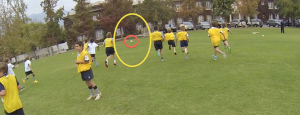
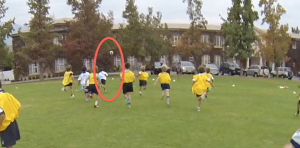
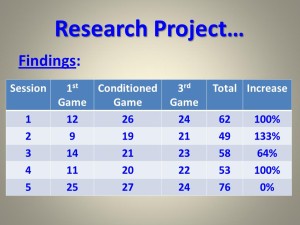
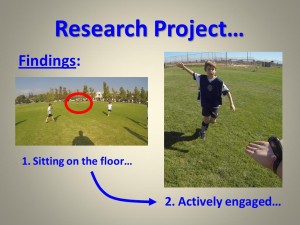
One thought on “The POWER of using ‘Teaching Games for Understanding’…”